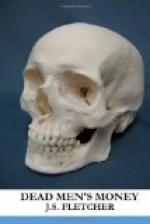“You’ve more to tell,” remarked Mr. Lindsey.
“Just so,” replied Chisholm. “And there’s two items. First of all—we’ve found that bag! Empty, you may be sure. In the woods near that old ruin on Till side. Thrown away under a lot of stuff—dead stuff, you’ll understand, where it might have lain till Doomsday if I hadn’t had a most particular search made. But—that’s not all. The second item is here—the railway folk at Cornhill are unanimous in declaring that by that same train which brought Phillips there, two men, strangers, that looked like tourist gentlemen, came as well, whose tickets were from—where d’ye think, then, Mr. Lindsey?”
“Peebles, of course,” answered Mr. Lindsey.
“And you’ve guessed right!” exclaimed Chisholm, triumphantly; “Peebles it was—and now, how do you think this affair looks? There’s so many tourists on Tweedside this time of the year that nobody paid any great attention that night to these men, nor where they went. But what could be plainer, d’ye think?—of course, those two had tracked Phillips from the bank, and they followed him till they had him in yon place where he was found, and they murdered him—to rob him!”
CHAPTER XV
FIVE HUNDRED A YEAR
It was very evident that Chisholm was in a state of gleeful assurance about his theory, and I don’t think he was very well pleased when Mr. Lindsey, instead of enthusiastically acclaiming it as a promising one, began to ask him questions.
“You found a pretty considerable sum on Phillips as it was when you searched his body, didn’t you?” he asked.
“Aye—a good lot!” assented Chisholm. “But it was in a pocket-book in an inner pocket of his coat, and in his purse.”
“If it was robbery, why didn’t they take everything?” inquired Mr. Lindsey.
“Aye, I knew you’d ask that,” replied Chisholm. “But the thing is that they were interrupted. The bag they could carry off—but it’s probable that they heard Mr. Moneylaws here coming down the lane before they could search the man’s pockets.”
“Umph!” said Mr. Lindsey. “And how do you account for two men getting away from the neighbourhood without attracting attention?”
“Easy enough,” declared Chisholm. “As I said just now, there’s numbers of strangers comes about Tweedside at this time of the year, and who’d think anything of seeing them? What was easier than for these two to separate, to keep close during the rest of the night, and to get away by train from some wayside station or other next morning? They could manage it easily—and we’re making inquiries at all the stations in the district on both sides the Tweed, with that idea.”
“Well—you’ll have a lot of people to follow up, then,” remarked Mr. Lindsey drily. “If you’re going to follow every tourist that got on a train next morning between Berwick and Wooler, and Berwick and Kelso, and Berwick and Burnmouth, and Berwick and Blyth, you’ll have your work set, I’m thinking!”




